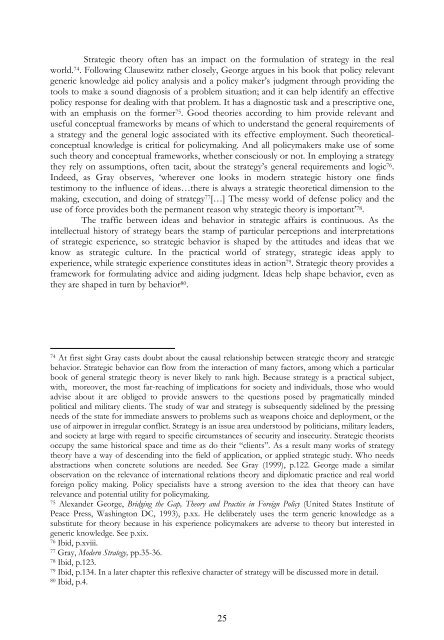Science, Strategy and War The Strategic Theory of ... - Boekje Pienter
Science, Strategy and War The Strategic Theory of ... - Boekje Pienter
Science, Strategy and War The Strategic Theory of ... - Boekje Pienter
You also want an ePaper? Increase the reach of your titles
YUMPU automatically turns print PDFs into web optimized ePapers that Google loves.
<strong>Strategic</strong> theory <strong>of</strong>ten has an impact on the formulation <strong>of</strong> strategy in the realworld. 74 . Following Clausewitz rather closely, George argues in his book that policy relevantgeneric knowledge aid policy analysis <strong>and</strong> a policy maker’s judgment through providing thetools to make a sound diagnosis <strong>of</strong> a problem situation; <strong>and</strong> it can help identify an effectivepolicy response for dealing with that problem. It has a diagnostic task <strong>and</strong> a prescriptive one,with an emphasis on the former 75 . Good theories according to him provide relevant <strong>and</strong>useful conceptual frameworks by means <strong>of</strong> which to underst<strong>and</strong> the general requirements <strong>of</strong>a strategy <strong>and</strong> the general logic associated with its effective employment. Such theoreticalconceptualknowledge is critical for policymaking. And all policymakers make use <strong>of</strong> somesuch theory <strong>and</strong> conceptual frameworks, whether consciously or not. In employing a strategythey rely on assumptions, <strong>of</strong>ten tacit, about the strategy’s general requirements <strong>and</strong> logic 76 .Indeed, as Gray observes, ‘wherever one looks in modern strategic history one findstestimony to the influence <strong>of</strong> ideas…there is always a strategic theoretical dimension to themaking, execution, <strong>and</strong> doing <strong>of</strong> strategy 77 […] <strong>The</strong> messy world <strong>of</strong> defense policy <strong>and</strong> theuse <strong>of</strong> force provides both the permanent reason why strategic theory is important’ 78 .<strong>The</strong> traffic between ideas <strong>and</strong> behavior in strategic affairs is continuous. As theintellectual history <strong>of</strong> strategy bears the stamp <strong>of</strong> particular perceptions <strong>and</strong> interpretations<strong>of</strong> strategic experience, so strategic behavior is shaped by the attitudes <strong>and</strong> ideas that weknow as strategic culture. In the practical world <strong>of</strong> strategy, strategic ideas apply toexperience, while strategic experience constitutes ideas in action 79 . <strong>Strategic</strong> theory provides aframework for formulating advice <strong>and</strong> aiding judgment. Ideas help shape behavior, even asthey are shaped in turn by behavior 80 .74 At first sight Gray casts doubt about the causal relationship between strategic theory <strong>and</strong> strategicbehavior. <strong>Strategic</strong> behavior can flow from the interaction <strong>of</strong> many factors, among which a particularbook <strong>of</strong> general strategic theory is never likely to rank high. Because strategy is a practical subject,with, moreover, the most far-reaching <strong>of</strong> implications for society <strong>and</strong> individuals, those who wouldadvise about it are obliged to provide answers to the questions posed by pragmatically mindedpolitical <strong>and</strong> military clients. <strong>The</strong> study <strong>of</strong> war <strong>and</strong> strategy is subsequently sidelined by the pressingneeds <strong>of</strong> the state for immediate answers to problems such as weapons choice <strong>and</strong> deployment, or theuse <strong>of</strong> airpower in irregular conflict. <strong>Strategy</strong> is an issue area understood by politicians, military leaders,<strong>and</strong> society at large with regard to specific circumstances <strong>of</strong> security <strong>and</strong> insecurity. <strong>Strategic</strong> theoristsoccupy the same historical space <strong>and</strong> time as do their “clients”. As a result many works <strong>of</strong> strategytheory have a way <strong>of</strong> descending into the field <strong>of</strong> application, or applied strategic study. Who needsabstractions when concrete solutions are needed. See Gray (1999), p.122. George made a similarobservation on the relevance <strong>of</strong> international relations theory <strong>and</strong> diplomatic practice <strong>and</strong> real worldforeign policy making. Policy specialists have a strong aversion to the idea that theory can haverelevance <strong>and</strong> potential utility for policymaking.75 Alex<strong>and</strong>er George, Bridging the Gap, <strong>The</strong>ory <strong>and</strong> Practice in Foreign Policy (United States Institute <strong>of</strong>Peace Press, Washington DC, 1993), p.xx. He deliberately uses the term generic knowledge as asubstitute for theory because in his experience policymakers are adverse to theory but interested ingeneric knowledge. See p.xix.76 Ibid, p.xviii.77 Gray, Modern <strong>Strategy</strong>, pp.35-36.78 Ibid, p.123.79 Ibid, p.134. In a later chapter this reflexive character <strong>of</strong> strategy will be discussed more in detail.80 Ibid, p.4.25
















